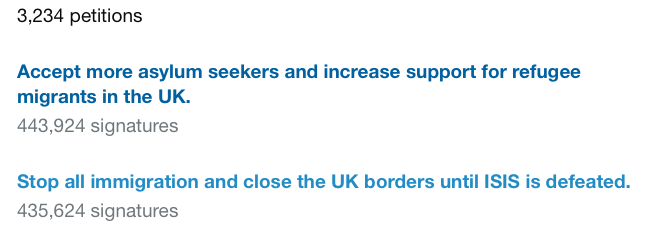
 Britain: Divided Kingdom
Britain: Divided Kingdom
Right now, Britain is divided into two 'camps'. On one side there are those who believe that we should open up our borders to asylum seekers running from war-torn countries, and on the other are those who think we should close our borders until the threat from ISIS has subsided.

The clear divide in the opinion of the British people is crystalised here https://petition.parliament.uk/petitions. The two most signed petitions are 'Accept more asylum seekers and increase support for refugee migrants in the UK' (443,843 signatures at the time of writing) and 'Stop all immigration and close the UK borders until ISIS is defeated.' (433,584 signatures at the time of writing) and these numbers are growing every day.
Those who are pro-refugee feel that we have a duty to offer safe asylum to the refugees who have escaped countries that have been forced to their knees by the fractured societies that call them home. With countries such as Germany and Sweden shutting their doors on those in need due to the sheer number of people trying to enter, many believe that the UK is 'not offering proportional asylum in comparison with their European counterparts'.

With political leaders such as Jeremy Corbyn calling on the government to recognise our obligation to help refugees, those supporting the pro-refugee position feel it is the UK's duty to take in their fair share of refugees, and stop them living in 'unsafe and inhumane conditions in Europe'. With the coming winter supposed to be one of the coldest on record, the urgency to find shelter for the thousands of refugees is intensifying.

On the other side of the argument, there are those that feel that we cannot let any refugees in until the threat of ISIS has receded. In February 2015, NATO's Deputy Assistant Secretary General for Emerging Security Challenges warned there would be IS jihadists hiding away on the boats with the refugees.
With the recent terrorist attacks in Paris, it has emerged that a Syrian man's passport was found outside the Parc Des Princes football stadium leading many to fear the worst - that Jihadists have used the refugee's plight as a Trojan Horse and are now living among them, lying in wait. Movements such as 'Britain First' are helping to fuel the ideology that the safety of the British people comes before anything else - leading to a massive splitting of opinions on social media such as Facebook.

Despite the pro-refugee petition leading the way in terms of signatures, a clear shift in the way Britain is viewing this situation is happening right now. In the past 24 hours, in the time the pro-refugee petition has received another 50 signatures, those putting their name behind closing the borders have increased by over 2000. This must be due to the constant terror threats and evacuations happening every day around the world since the Paris attacks a week ago.
Of course, these petitions do not speak for the country as a whole; there are less than 1 million signatures between the two petitions - with a population of over 65 million, the majority of British opinion is not documented. However, it is most certainly an interesting reflection of society being split between two distinct ideologies.
Perhaps one way to settle the argument would be to consider a utopian universe; one similar to the concept coined by Benedict Anderson in his book Imagined Communities. A borderless society would eradicate the idea of nationalism and all the negativities that come with it: every human being would have the right to live wherever they please, without being denied entry, and those seeking refuge would have less problems and create a more unified and universal global community.

However, of course, there are arguments against the utopian idea of a borderless world. There are those who would argue that without borders, there would be no restrictions in place to restrict terrorism; it would be far easier to spread without border checks and regulations. Furthermore, it could be argued that the idea of national identity is needed to unite communities; creating common causes and interests that differ vastly from culture to culture.
Ultimately though, what is evident is that we exist in a ‘Divided Kingdom’ when it comes to the nations’ standpoint on the Refugee Crisis and immigration.
